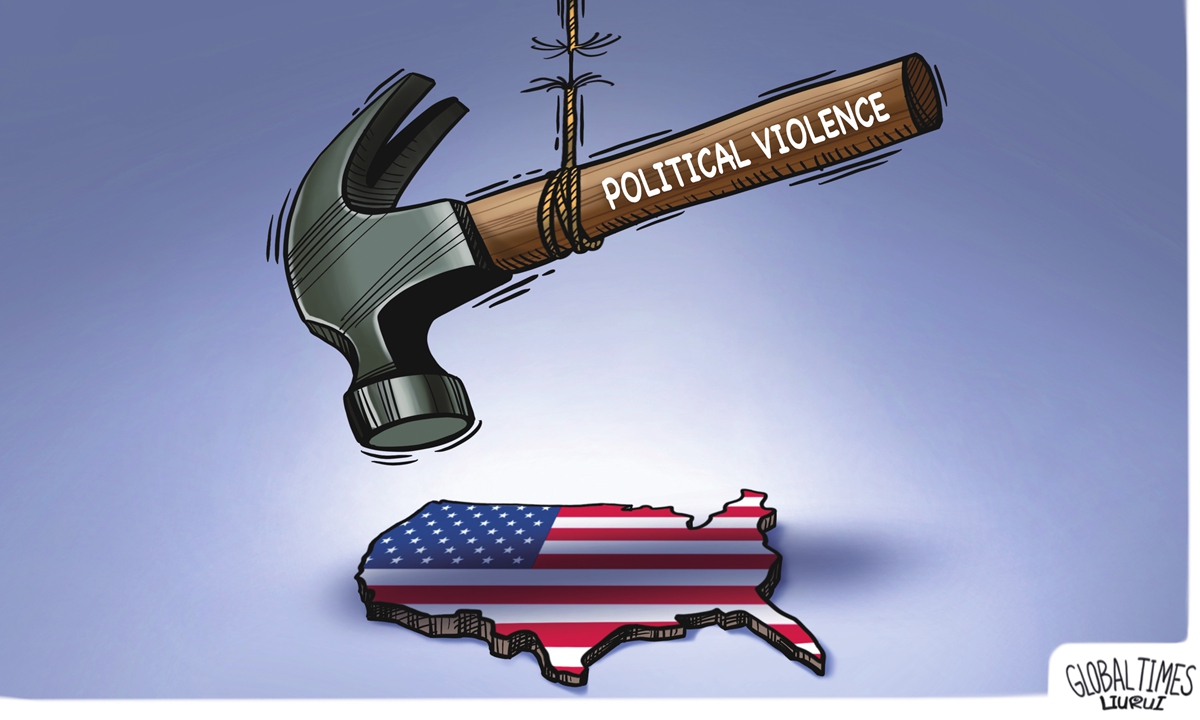
Illustration: Liu Rui/Global Times
As election competition becomes increasingly fierce, the current political polarization in the US has become more worrying for the world. The development of political polarization promotes the emergence of more political violence, and the increase in political violence further leads to the escalation of political polarization.According to a national survey released in June conducted by Robert Pape, a professor at the University of Chicago and director of the Chicago Project on Security and Threats, about 10 percent of US adults surveyed, one-third of whom admitted to owning guns, agreed that the “use of force is justified to prevent Donald Trump from becoming president.” Meanwhile, 7 percent of those surveyed, half of whom own guns, said they “support force to restore Trump to the presidency.”
Political violence refers to violence carried out to achieve political goals. Electoral violence is a significant form of political violence, encompassing acts of coercion, intimidation or physical harm aimed at influencing the electoral process, or election results. This also includes actions to disrupt voting, protest the election outcomes, or suppress protests against election results. A 2023 poll conducted by the US polling agency PRRI found that 23 percent of respondents believe that "American patriots may have to resort to political violence to save our country" in 2024, a notable increase from the 15 percent reported in 2021.
Political violence and political polarization have formed a vicious cycle, highlighting the current political dilemma in the US and the major crisis in national governance.
First, political polarization is the polarization of values, beliefs, and ideologies between liberals and conservatives on the US’ political spectrum. Both sides believe that their opposite party's beliefs are very different from their own, and they are unwilling to make compromises. In the most extreme cases, conflicts can reach the point of incompatibility. The conflicts between the two factions are most obvious on issues such as abortion, immigration and government governance. Demonizing opponents is an important manifestation of political polarization.
Second, political polarization has profoundly affected electoral politics and the legislative process in the US. For each side, it is believed that the victory of the other party will threaten its own beliefs, values and practical interests, and it is necessary to use all its strength to resist its opponent's victory. In the process of political competition, the public interests and national interests of the majority are replaced by narrow partisan interests.
Third, political polarization has evolved into a form of political violence, showing that more and more people in US society, disappointed with the country’s democratic politics, believe that their demands and concerns cannot be addressed through legislation or elections. Instead, they turn to violent solutions. Trump's supporters mainly come from the middle and lower classes. They generally feel marginalized in their own country and fear being replaced by immigrants. Biden’s supporters and liberal Democrats view Trump and his supporters as threats to US democratic values and institutions. As the election results directly impact their future, more people from both parties are justifying political violence.
The root cause of political polarization and violence lies in the severe disparity between the rich and poor, as well as the hopelessness of social change in US society. The widening gap between the rich and poor is the root cause of major social problems in the US, including political polarization, gun violence, political violence and racial discrimination. During the upcoming national conventions, the two parties will announce the planks of their election campaign, but neither the power groups nor their political agents in the US are interested in real social reform programs and redistribution of wealth. Transferring domestic social conflicts in the US to other parts of the world or promoting the intensification of values or ideologies are strategies exerted by the US establishment to oppose fundamental social changes.
Looking to the future, if the US is unable to change the current situation of political polarization, political violence is likely to intensify, further exacerbating the vicious cycle between those two phenomena. As Ian Bremmer, president of the Eurasia Group, a major US think tank, said, more political violence and social instability are to come in the US.
The author is a professor at the School of International Relations and director of the Center for American Studies at Peking University. opinion@globaltimes.com.cn
